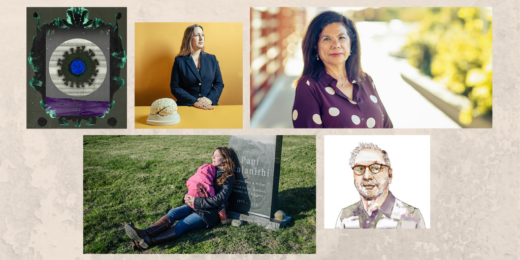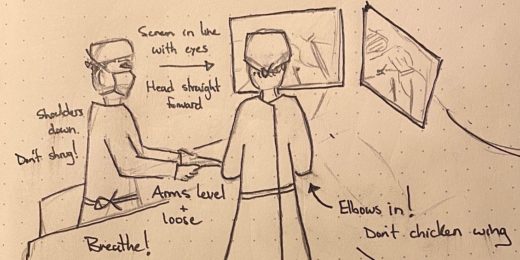In 2020, contributing editor Paul Costello’s top podcasts reflect the challenges of the coronavirus and other timely health care issues.
Month: December 2020
Stanford Medicine magazine’s top reads of 2020
Stanford Medicine magazine's most-read articles of 2020 were about COVID-19, grieving and chemo brain, a misunderstood side effect of chemotherapy.
Surgical sketches help Stanford surgeon practice, teach
Graeme Rosenberg's illustrations, shared in classes he teaches and on social media, are resonating with fellow surgeons at Stanford and beyond.
In the Year of the Nurse, front lines take on pandemic
In a short video, nurses from Stanford Health Care speak candidly about what the past months in the pandemic have been like and what it means to be a nurse.
How do the new COVID-19 vaccines work?
The Pfizer and Moderna COVID-19 vaccines are the first to use the RNA coding molecule to prompt our bodies to fight the virus. Here's how they work.
Mapping how the brain thinks, neuron by neuron
Stanford researchers have created a molecular probe designed to map how the brain works by tagging, recording and controlling functions of individual cells.
How one Stanford physician decided to get the COVID-19 vaccine
Stanford Health Care physician Megan Mahoney, MD, describes how conversations with family helped her decide to be among the first to get the COVID-19 vaccine.
Lab scientists: Unseen, unsung heroes of the pandemic
Lab scientists in the Stanford Clinical Virology Lab, processing thousands of samples a day, fight the coronavirus pandemic behind the scenes.
How telehealth has exploded during the pandemic and why it is here to stay
In Stanford Medicine's Recover, Restore and Re-open framework, experts discuss how the shift to telehealth likely represents the new norm.
After George Floyd’s death, a Black neurosurgeon discusses racism, despair and hope
For Black neurosurgeon Samuel Cheshier, George Floyd's killing confirmed that his country is racist; but the aftermath brought hope that change is possible.
Prison ‘aha’ moment leads to research into mental health and addiction
Stanford researcher finds that inpatient psychiatric care helps long-term recovery rates for people with both mental illness and addiction.
Slogging through sewage in search of COVID-19
Environmental engineer Alexandria Boehm measures coronavirus in wastewater to determine if sewage testing can inform public health decisions about COVID-19.
COVID-19 as a ‘wake-up call’ for creating more equitable health care
Recover, Restore and Re-open, Stanford Medicine's framework for navigating the pandemic, addresses health disparities among racial groups.
Running clinical trials in a pandemic
Doctors and researchers are prioritizing a digital-first approach as they adapt clinical trials to the COVID-19 pandemic.
Bat-borne Nipah virus could help explain COVID-19
Understanding similarities between the Nipah virus and COVID-19 could provide clues for avoiding future novel virus outbreaks.
Kudos for Stanford Hospital’s many technical innovations
A host of new technology at Stanford Hospital has earned the Healthcare and Life Sciences Eye on Innovation Award from Gartner, a research and advisory firm.

















